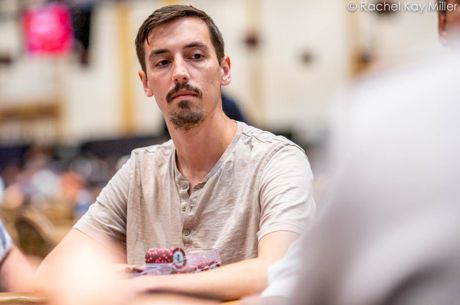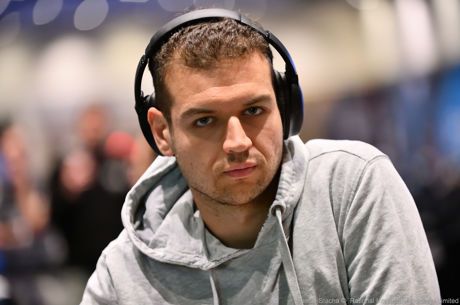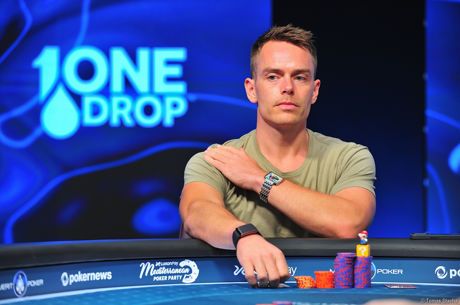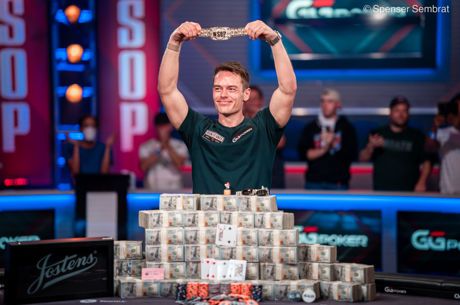Phil Hellmuth: "I'm Beginning to Tackle the Poker Brat"

Phil Hellmuth was once a 24-year-old kid with dreams of poker stardom and a computer-like brain crammed with math knowledge. He became world champion in 1989 when he defeated the legendary 'Orient Express', Johnny Chan, and changed the future of poker.
Twenty-eight years later, Hellmuth sits atop the all-time bracelet rankings with 14 to his name, four more than Doyle Brunson, Phil Ivey, and 'Chan The Master'. Hellmuth's eyes glitter as he recalls his breakthrough nearly three decades earlier.
"I thought I was the best hold'em player in the world by far," Hellmuth tells PokerNews. "I was doing things they'd never done before, using a different style and making small-size bluffs instead of bigger bluffs. I protected my stack. I'd be willing to risk 10% of my chips on any crazy gamble, but I always protected the 90% and put myself in amazing positions.
"I thought I was the best hold'em player in the world by far. I was doing things they'd never done before."
"I kept winning, and there were three or four poker 'majors' back then in 1989. I'd already won the Bicycle Club Main Event in 1988 and finished second the event before that. I felt like I knew all the great players and they knew me. I knew T.J. Cloutier, Hans "Tuna" Lund, Jack Keller and Stu Ungar, but I already felt like I was the best."
When the heads-up of the Main Event rolled around, Johnny Chan was going for three in a row, which would have made him the best in the world bar none to commentators at the time. Only Hellmuth stood in his way. But the kid from Madison, Wisconsin was to prove his own prophecy to be true.
"I think Johnny was frustrated playing small-ball with me. Four hands before the final hand, I raised with A♦7♦ and I'll always remember that because he went broke on A♠7♠. I made it 35,000 to go and he raised to 130,000 more. It's a huge raise, which today's generation think is bad – next year they'll think it's good somehow – but even though I thought I probably have the best hand, I laid it down. Four hands later, I looked down at two black nines and saw the writing on the wall. I made it 35,000, he made it 130,000 more and right away I moved all-in."
Chan didn't call straight away, but this time, there was no which had made his 1988 victory over Erik Seidel in the Main Event so memorable. He was the one with the decision. Hellmuth didn't know what to do.
"I just sat there in my chair and thought 'Do I want to talk and scare him out?' The more I thought he didn't have the premium hands, I didn't know what I was rooting for. I could already eliminate ace-ten but he could have king-queen or king-jack and I didn't want him to call with those. I thought I'd better just shut up. I told myself, 'If you talk him out of a hand you would have won the Main Event with and he comes back and beats you, you'll never know.' I'd already blown a few tournaments by talking. I shut up, put my headphones on and waited. Fortunately, he called with A♠7♠."
Hellmuth was a decent favorite, a 67% shot, but he took nothing for granted.
"There were three of us in our twenties who were considered great players on the way up, but it was more of an older person's game then. It isn't anymore."
"I thought he was going to suck out. I'd watched him get it in bad and won all these tournaments where he kept sucking out to win. He kept hitting his kicker and I was thinking to myself 'Man, I'm not going to win this pot.' The king-king-ten flop was good, but the queen on the turn saw me scared. That meant I was the same odds as before the flop. In my mind, I was thinking 'He's going to hit a jack and make a straight'. I was calculating how many chips he'd have so I could get ready for the next hand."
That fear, the nervous feeling of thinking that the job might not quite be done is an early sign of the obsessive nature of Hellmuth's poker drive. The reason he feared the suck-out wasn't entirely because of Chan, but the situation, the surroundings and the twisted magic that makes up up the greatest tournament in poker.
"It was because it was the Main Event," Hellmuth explains. "Then it happened. The river was a six, my hands went up in the air and my Dad came running over. Johnny told me he didn't play his best that day, but he didn't underestimate me. He'd said in Esquire magazine that I was going to win a Main Event. So he already knew it was coming, just not that year."
No one has dominated the Main Event the same way ever since. Not one player has won the event back-to-back since Johnny Chan, and with the sheer volume of players in each year's Main Event, it may never happen again. Hellmuth realizes his own part in creating the monster that the Main Event is to this day.
"I'm partly responsible. Back then I was the young guy. I was 24, Johnny Chan and Erik Seidel were both 28. There were three of us in our twenties who were considered great players on the way up, but it was more of an older person's game then. It isn't anymore."

The Next Stage
Fast forward almost three decades and Phil Hellmuth is no longer an up-and-coming player. He's the figurehead for bracelet success that young players are eager to topple. Much of Hellmuth's enjoyment comes from trying to take on the very best in the game, and they don't come much better than the field in the $50,000 Poker Players Championship.
"There are years you don't play your best and years you do," Hellmuth says. "Then there are years you play your best and catch the cards; those are the best. You pick up bracelets or a 1st and 2nd, like in 2012 when I won two bracelets. After having a really bad World Series in 2016, I was convinced I was going to have a great series in 2017. I spent 12 hours a day back in February talking poker with Brandon Cantu, Mike Matusow and 'Miami' John Cernuto. Mike Matusow has had some great results since. We taught Mike a few things, specifically about Omaha 8 or Better and he taught us a few things.
"So, I put in the effort and it was still very disappointing in the Poker Players' Championship. I was frustrated that there were players who don't even play all the games and had a lot of chips. That's my own stupidity to be frustrated. It shouldn't bother me, but it's poker. It's just variance."
We challenged Hellmuth to the idea that if he was to eliminate the part of him that is the 'Poker Brat' then he might lose what drives him, the inner temperamental side of himself.
"Losing to inferior players feels like they're winning my chips and I don't deserve to lose them."
"You can't throw out the baby with the bathwater. But I've kept making subtle improvements. I used to have a silly abandonment issue with my wife. We were super happy for 27 years and worked really hard on our relationship and then I thought she didn't answer my texts one day and the next day, so was concerned. She'd say 'We've been together 27 years and I have actually been answering your texts', and it hit me that there was a little bit of an abandonment issue that I had.
"Once I saw it clearly for the first time and thought what's wrong with me. My wife's a super successful doctor and can't always get back to me, dealing with families and patients. One day all of that abandonment problem I had just disappeared and my comfort level improved. I put her on a pedestal, but there's now a steadiness and a calmness. When you work hard on your primary relationship, great things happen to your other relationships. You become a better, smarter man."
That self-awareness hasn't been easy to deal with at times, but Hellmuth credits it for improving him lately. Maybe the 'Poker Brat' will be a changed man in the future.
"I think for the first time I'm beginning to tackle the Poker Brat stuff. I put myself on a poker pedestal with maybe three or four other guys. 99% of the world puts me on this pedestal. When I start getting unlucky, I feel like I'm falling off the pedestal. That's when I start fighting because I want to show everybody how great I am.
"Losing to inferior players feels like they're winning my chips and I don't deserve to lose them. It caused some desperate whining on my part and I'm not proud of that. At times I've beaten it. In 2007, it wasn't there for a month, I beat it for a bit. At times I can be at ease.
"I remember getting all my money in with kings early in a tournament for a 150-big blind pot against a guy with jacks and he hit a jack on the flop and another jack on the river. I thought it was absurd, but I smiled and thought that's why I'm the best because I'd never put 20 big blinds in with jacks against kings. About two days ago, I realized I'm on the pedestal and listening to the 1% to beat myself up. I need to live the life, be the greatest. I should listen to the 99%."
Hellmuth is the record-holding WSOP bracelet winner, but remains hungry for more, to stretch his lead on Chan, Brunson and Ivey, a player who Hellmuth regards as one of the greatest in the game, but who sadly for many fans, no longer plays as many bracelet events.
"Ivey's an amazing player. If you look at the number of WSOP tournaments he's played and I've played, even though he's missed a couple of years, you'd find they're very similar. We're very close and maybe we've played 400 events each. I'm getting closer this trip, though. I'm watching everyone play and the mistakes I'm seeing are flashing in my mind. I'm not saying a word and that's when I'm at my best, observing and playing my best.
"They used to say in the 1990's, 'Who improves players better than Phil? Just sit at his table and he'll tell you all the mistakes you're making.' It was a joke. If I keep myself on that pedestal and don't let the little stuff bother me, I'm using less energy and playing better."
Hellmuth's infamous moments of raging tilt have lit up YouTube since its inception in 2005. But according to the man himself, he never tilted. How much of that is bluster and what is the truth behind the brattish comebacks and pithy rebukes of opponents' comments?
"I put myself on a poker pedestal with maybe three or four other guys. When I start getting unlucky, I feel like I'm falling off the pedestal."
"How many times have I had the lead in no-limit events the last few years? I keep falling 20th or 28th because of self-inflicted wounds.
"My wife and I discussed today writing down my comments. I can walk away for five minutes, but I have to figure a refocusing mechanism. When I'm at my best, I can work out the limits, how many big blinds I have and work out my strategy for the next hand. People think it gets to me. If I carried that stuff around with me all the time everywhere I go I'd have some issues, but I don't. I'm with amazing people in great places and I have such an amazing life."
Hellmuth the Storyteller
Hellmuth's life is documented in his latest book, Poker Brat, which lifts the lid on his experiences away from the table as well as his successes and failures on the felt.
"I'm really excited about it, and it's been a labor of love. I'd been reading a bunch of books and I pulled out mine for the first time in five years and really like the writing. It sucks you in. The first 70,000 words were up to 1993, but those first 20 chapters were rewritten up to 20 times. You get better and better as a writer and so when I look back, Play Poker Like the Pros (Hellmuth's first book) was a bestseller but I read it and I don't think it's great writing. I could do better and I wanted to share the struggles.
"Most of us struggle in our first 18-20 years on the planet. I did, being the oldest of five children and suffering from ADHD 30 years ago when it was disregarded. I'd get a 2.7 or 2.8 and my Dad had a PHD, and MBA and more. High school was tough, so to grow up from that and do what I've done is cool. It might help for people to read about me struggling in high school."
Hellmuth's struggles aren't limited to his childhood. Fifteen years ago, he nearly lost the one person who has been his rock.
"My wife almost left me in 2001/2002 and I talked to my friends about the same issues. That's where the work comes from in the book. I'm married to someone who's brilliant. I was ready to leave her two years ago and I wrote about that too, so it is very revealing and personal. I worked hard to fight for her and she worked hard to fight for me. We took the pain of nearly losing each other into therapy to improve ourselves. Someone can read this book and see that the struggles I had in marriage still meant that I stayed loyal, fought hard and am super happy that I did. It's a very relatable book."

A Lifelong Marriage to Poker
Hellmuth's quest for his 15th bracelet hasn't come to fruition so far this World Series, but as you might expect, he is resolute in his belief that positivity and effort will continue to provide him with the incredible highs that his career has been full of.
"If you're not improving at this game, you're going backwards," he says. "If I had five years when I could have done something different it would be 2004 to 2009, when I didn't put the work in. I could have just played mixed games for five days. You can't play Stud 8 or Better or Razz once a year and expect to win. It wasn't until 2010 that I really put the time into mixed games to get better.
"I had a great feeling about the 2017 World Series of Poker and it's not over yet. There's always the Main Event and I'm not giving up. I feel like I've played well enough to win a bracelet and you have to be careful to say it but I feel like maybe I would deserve to win one this year. I've maybe been lucky to win bracelets in the past though. You need to put yourself in that position and great things will happen."
Hellmuth's lifelong relationship with poker is one with which he finally seems at ease. Nothing is guaranteed in poker, but that elusive 15th bracelet will almost certainly happen sooner rather than later. Maybe the Poker Brat has grown up after all, the therapy of each new tournament pushing him on and healing old scars.
Poker and Phil Hellmuth have been synonymous for so long it's hard to argue they weren't meant to be together forever.









